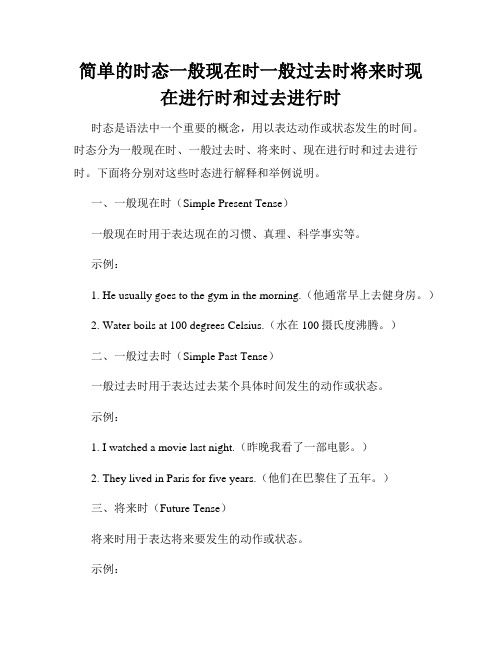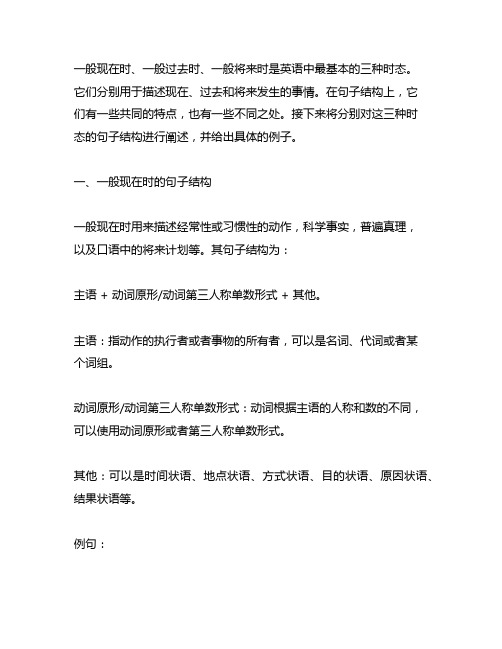一般过去时_一般现在时_一般将来时
一般现在时-一般过去时-一般将来时-过去将来时

一、一般现在时的用法1)经常性或习惯性的动作,常与表示频度的时间状语连用。
时间状语:often,usually,always,sometimes,every week(day,year,month...),once a week,on Sundays,etc.例如:I leave home for school at 7 every morning. 每天早上我七点离开家。
2)客观真理,客观存在,科学事实。
例如:The earth moves around the sun. 地球绕太阳转动。
Shanghai lies in the east of China. 上海位于中国东部。
3)表示格言或警句。
例如:Pride goes before a fall. 骄者必败。
注意:此用法如果出现在宾语从句中,即使主句是过去时,从句谓语也要用一般现在时。
例如:Columbus proved that the earth is round. 哥伦布证实了地球是圆的。
4)表示主语的特征、性格、能力、爱好等。
例如:He can swim.I work hard.I like watching TV.二、一般过去时的用法1)在确定的过去时间里所发生的动作或存在的状态。
时间状语有:ago,yesterday,the day before yesterday,last week(year,night,month...),in 1989,just now,at the age of 5,one day,long long ago,once upon a time,etc.例如:Where did you go just now? 刚才你上哪儿去了?2)表示在过去一段时间内,经常性或习惯性的动作。
例如:When I was a child, I often played football in the street.我是个孩子的时候,常在马路上踢足球。
简单的时态一般现在时一般过去时将来时现在进行时和过去进行时

简单的时态一般现在时一般过去时将来时现在进行时和过去进行时时态是语法中一个重要的概念,用以表达动作或状态发生的时间。
时态分为一般现在时、一般过去时、将来时、现在进行时和过去进行时。
下面将分别对这些时态进行解释和举例说明。
一、一般现在时(Simple Present Tense)一般现在时用于表达现在的习惯、真理、科学事实等。
示例:1. He usually goes to the gym in the morning.(他通常早上去健身房。
)2. Water boils at 100 degrees Celsius.(水在100摄氏度沸腾。
)二、一般过去时(Simple Past Tense)一般过去时用于表达过去某个具体时间发生的动作或状态。
示例:1. I watched a movie last night.(昨晚我看了一部电影。
)2. They lived in Paris for five years.(他们在巴黎住了五年。
)三、将来时(Future Tense)将来时用于表达将来要发生的动作或状态。
示例:1. We will have a meeting tomorrow.(我们明天要开会。
)2. She is going to travel to Japan next month.(她下个月将要去日本旅行。
)四、现在进行时(Present Continuous Tense)现在进行时用于表达正在进行的动作。
示例:1. They are watching TV at the moment.(他们此刻正在看电视。
)2. She is studying for her exam right now.(她正在复习考试。
)五、过去进行时(Past Continuous Tense)过去进行时用于表达过去某一时刻正在进行的动作。
示例:1. I was reading a book when she called.(她给我打电话的时候,我正在看书。
英语时态汇总

英语时态汇总英语中有16种时态,主要包括一般现在时、一般过去时、一般将来时、过去将来时、现在进行时、过去进行时、将来进行时、过去将来进行时、现在完成时、过去完成时、将来完成时、过去将来完成时、现在完成进行时、过去完成进行时、将来完成进行时以及过去将来完成进行时。
以下是其中一些常见时态的基本结构和用法:1.一般现在时:结构:主语+动词原形/第三人称单数形式用法:描述经常发生的动作或状态;表示客观事实或普遍真理;表示主语的特征、性格、能力等。
2.一般过去时:结构:主语+动词过去式用法:描述过去某个时间发生的动作或状态;描述过去经常发生的动作或状态;表达过去的经历或背景信息。
3.一般将来时:结构:主语+will/shall+动词原形用法:描述将来某个时间将要发生的动作或状态;表达将来的计划、安排或预测。
4.过去将来时:结构:主语+would/should+动词原形用法:描述过去某个时间将来要发生的动作或状态;表达过去的计划、安排或预测。
5.现在进行时:结构:主语+be动词(am/is/are)+动词ing形式用法:描述正在进行的动作或状态;表达即将发生的动作或状态。
6.过去进行时:结构:主语+be动词的过去式(was/were)+动词ing形式用法:描述过去某个时间正在进行的动作或状态;表达过去某个时刻的正在进行的动作。
7.现在完成时:结构:主语+have/has+过去分词用法:描述从过去某一时刻开始,一直持续到现在的动作或状态;强调动作对现在的影响或结果。
8.过去完成时:结构:主语+had+过去分词用法:描述在过去某一时刻之前已经完成的动作或状态;表示过去的某个动作发生在另一个过去的动作之前。
这些时态只是英语时态的一部分,掌握这些时态的基本结构和用法对于理解和运用英语非常重要。
在实际使用中,还需要根据具体的语境和需要选择适当的时态。
一般现在时一般过去时一般将来时的句子结构

一般现在时、一般过去时、一般将来时是英语中最基本的三种时态。
它们分别用于描述现在、过去和将来发生的事情。
在句子结构上,它们有一些共同的特点,也有一些不同之处。
接下来将分别对这三种时态的句子结构进行阐述,并给出具体的例子。
一、一般现在时的句子结构一般现在时用来描述经常性或习惯性的动作,科学事实,普遍真理,以及口语中的将来计划等。
其句子结构为:主语 + 动词原形/动词第三人称单数形式 + 其他。
主语:指动作的执行者或者事物的所有者,可以是名词、代词或者某个词组。
动词原形/动词第三人称单数形式:动词根据主语的人称和数的不同,可以使用动词原形或者第三人称单数形式。
其他:可以是时间状语、地点状语、方式状语、目的状语、原因状语、结果状语等。
例句:1. I study English every day.(我每天学英语。
)2. He speaks Chinese fluently.(他讲中文流利。
)3. The sun rises in the east.(太阳从东方升起。
)二、一般过去时的句子结构一般过去时用来描述过去发生的事情或者已经完成的动作。
其句子结构为:主语 + 动词过去式 + 其他。
例句:1. I finished my homework yesterday.(我昨天完成了我的作业。
)2. She bought a new car last week.(她上周买了一辆新车。
)3. They visited the museum two days ago.(他们两天前参观了博物馆。
)三、一般将来时的句子结构一般将来时用来表示将来发生的动作或者情况。
其句子结构为:主语 + will/shall + 动词原形 + 其他。
例句:1. I will go to the cinema tomorrow.(我明天将去电影院。
)2. She shall help you with your project next week.(她下周将帮助你完成项目。
一般过去时,一般现在时和一般将来时

第一讲一般过去时,一般现在时和一般将来时一般过去时一.概念(1)过去某个特定时间发生,并且一下子就完成了的动作(即:非持续性动作);(2)过去习惯性的动作。
一般过去时不强调动作对现在的影响,只说明过去。
二.注意事项1.在谈到已死去的人的情况时,多用过去时。
2.表示过去连续发生的动作时,要用过去时。
这种情况下,往往没有表示过去的时间状语,而通过上下文来表示。
3.表示过去一段时间内经常或反复的动作常与always,never等连用。
I always carried a pen.我过去老是带着一支笔。
(只是说明我过去的动作,不表明我现在是否常带着笔。
)比较I always carries a pen.我老是带着一支笔。
(说明这是我的习惯,表明我现在仍然还习惯总带着一支笔)I never drank wine.我以前从不喝酒。
(不涉及到现在,不说明现在是否喝酒)4.如果强调已经终止的习惯时要用used to doMy father used to drink.我爸爸过去喝酒。
(意味着我爸爸现在不喝酒了。
喝酒这个动作终止了)I used to take a walk in the morning.我过去是在早晨散步。
(意味着现在不在早晨散步了)比较I took a walk in the morning .我曾经在早晨散过步。
(只是说明过去这一动作)一般现在时1.概念:一般现在时表示经常的、习惯性的动作或存在的状态。
2.构成:一般现在时的构成主要有两种形式:(1)be型:句子的谓语动词只有be(am,is或are):(2)实义动词型:句中的谓语动词为实义动词(也叫行为动词):3. 一般现在时的用法1) 经常性或习惯性的动作,常与表示频度的时间状语连用。
时间状语:every…, sometimes, at…, on Sunday2) 客观真理,客观存在,科学事实。
The earth moves around the sun.Shanghai lies in the east of China.3) 表示格言或警句中。
复习一般现在时,一般过去时,一般将来时,现在进行时

复习一般现在时,一般过去时,一般将来时,现在进行时回顾一般现在时、一般过去时、一般将来时和现在进行时一、考点、热点回顾1、一般现在时A、用法①表示现阶段经常性、习惯性的动作;②表示现阶段经常性、习惯性存在的状态;③表示客观真理;④表示格言或警句中。
He usually goes to school by bus.The sky is blue.The earth moves around the sun.Shanghai lies in the east of China.Pride goes before a fall. 骄者必败。
B、常用的时间状语often, usually, always, every morning/night/evening/day/week and so on.2、一般过去时A、用法①表示过去某个时间发生的事;②表示表示过去某个时间存在的状态;③表示过去反复发生的动作。
I saw a very good film yesterday.It was very cold last night.B、常用的时间状语yesterday, yesterday morning/afternoon/evening, last week/month/year, in 1980 and so on.3、一般过去时A、用法①表示在将来某个时间要发生的事;②表示表示在将来某个时间存在的状态;Mrs Wu will teach us English this term.I will go back to my hometown tomorrow.B、具体表现形式①助动词will+动词原形We won’t leave before eight.②be going to do sth.表示即将发生某事或打算、计划要做某事。
I’m going to do my homework this evening.③come, start,go ,move, leave, travel等动词常用进行时态表示按计划将要发生的事。
五种时态一般现在时的_一般过去式_现在进行_现在完成时_一般将来时
• • • • • • • • • • • • • • • • • • • • • • • • • • •
( ) 19. The day after tomorrow they ________ a volleyball match. A. will watching B. watches C. is watching D. is going to watch ( ) 20. There ________ a birthday party this Sunday. A. shall be B. will be C. shall going to be D. will going to be ( ) 21. They ________ an English evening next Sunday. A. are having B. are going to have C. will having D. is going to have ( ) 22. ________ you ________ free next Sunday? A. Will; are B. Will; be C. Do; be D. Are; be ( ) 23. He ________ there at ten tomorrow morning. A. will B. is C. will be D. be ( ) 24. ________ your brother ________ a magazine from the library? A. Are; going to borrow B. Is; going to borrow C. Will; borrows D. Are; going to borrows ( ) 25. – Shall I come again tomorrow afternoon? –________ (好的). A. Yes, please B. Yes, you will. C. No, please. D. No, you won’t. ( ) 26. It ________ the year of the horse next year. A. is going to be B. is going to C. will be D. will is ( ) 27. ________ open the window? A. Will you please B. Please will you C. You please D. Do you
一般现在时、现在进行时、一般将来时、一般过去时知识点总结
一般现在时、一般将来时、一般过去时、现在进行时知识总结一、一般现在时一般现在时表示经常性或习惯性的动作,常与表示频度的时间状语连用,如often, usually, always, sometimes, never, seldom, every week/day/year/month..., once a week, on Sundays等。
动词用原形。
当主语为第三人称单数时(he, she, it, 一个人名),动词变为三单形式。
第三人称单数的动词变化规则:(只有在第三人称(he, she, it, 一个人名)为主语的肯定句中,动词才用三单式)(1)一般情况下,直接加s runs gets likes(2)结尾是s, x, sh, ch, o,前为辅音字母,结尾加es watches, goes, washes, crosses, mixes, does(3)动词末尾y,前为辅音,将y改为i加es study→studies fly→flies但在y前如果为元音则直接加s buys says plays(4)不规则变形have—has二、一般将来时一般将来时表示将来发生的事。
常与tomorrow, next day/week/month/year..., soon, in a few minutes, the day after tomorrow, in the future等时间状语连用。
Will/shall +动词原形;(shall用语第一人称)be(am/is/are) going to+ 动词原形三、一般过去时一般过去时表示过去某一时候或某一段时间所发生了的事情或存在的状态。
常与过去时间yesterday,ago, this morning,just now,a moment ago,last night / year / week/month,once upon a time,the other day,before,the day before yesterday, in 1989, at the age of five, one day, then(那时), on that day,in the past连用。
简单的时态一般现在时一般过去时和将来时
简单的时态一般现在时一般过去时和将来时时态是语法中的一个重要概念,它主要用来表示动作或状态发生的时间。
在英语中,时态分为一般现在时、一般过去时和将来时三种。
一、一般现在时一般现在时表示经常性的或习惯性的动作,或者表述普遍真理、自然规律等。
1.形式一般现在时的动词形式为原形动词。
例如:I eat an apple every day.He speaks English fluently.2.用法(1)表示日常习惯、常态或经常性的动作。
例如:She always brushes her teeth before going to bed.They usually go for a walk after dinner.(2)表示客观事实、普遍真理或自然规律。
例如:The sun rises in the east.Water boils at 100 degrees Celsius.(3)表示评论、观点或感受等。
例如:I think he is a talented musician.She looks beautiful in that dress.二、一般过去时一般过去时表示过去某个时间发生或完成的动作。
1.形式一般过去时的动词形式为动词的过去式。
例如:I studied English last night.He played basketball with his friends yesterday.2.用法(1)表示过去某个时间发生的动作。
例如:We visited the museum last week.She met her old friend at the party.(2)表示过去经常性的动作。
例如:He always ate breakfast at home when he was a child.(3)表示过去的习惯、惯常动作。
例如:Every morning, she woke up early and went jogging.三、将来时将来时表示将来某个时间发生或完成的动作。
一般过去时_一般现在时_一般将来时
变化规则
例词
一般在词尾加—ed
play→played
以不发音的e结尾的,只 like →liked
加--d
love →loved
以辅音字母+y 结尾的, study →studied
变y为i ,再加—ed
carry →carried
以一个辅音字母结尾的 重读闭音节,先双写这 个辅音字母,再加-ed
7. At 8:00 A.M, she w__a_tc_h_e_s_(watch) TV with her parents. 8. __D__o_es___ Mike__r_e_a_d___(read) English every day? 9. How many lessons _d_o_e_s__ your classmate__h_a_v_e__
Some day people will not go to the moon . 一般疑问句:把will 提到句子主语之前,结尾变问号。
Will Some day people go to the moon ?
特殊疑问句:特殊疑问词+will +主语+动词原形+其他?
Where will some people go ?
4)We will meet at the stop at 10:30.(一般疑问句) _W__il_l _____ you _m__e_e_t _ at the bus stop at 10:30?
5)She’s going to listen to music after school(划线提问) __W__h_a_t___ is she going to __d_o______ after school?
- 1、下载文档前请自行甄别文档内容的完整性,平台不提供额外的编辑、内容补充、找答案等附加服务。
- 2、"仅部分预览"的文档,不可在线预览部分如存在完整性等问题,可反馈申请退款(可完整预览的文档不适用该条件!)。
- 3、如文档侵犯您的权益,请联系客服反馈,我们会尽快为您处理(人工客服工作时间:9:00-18:30)。
实用文档
一般现在时:Present Simple
表示经常或者反复发生的动作 Nhomakorabea信息词:
often(经常)
sometimes(有时)
always(总是)
usually(通常)
every day(每天)
every week(每周)
every month(每月) every term(每学期)
every year(每年)
7. 7. Tonaylwagyosesgoesalways to school at
eight doo’clock.
8. 8. Whhaats
they实用文档 eat in the
一般过去时:Past Simple
表示过去发生的动作或存在的状态
实用文档
行为动词的一般过去时: ➢陈述句:主语+动词过去式+其它
动词的时态
实用文档
Taohua School L
教学目标
• 分辨一般现在时,一般将来时与一般过去时 • 三种时态的用法与特征
实用文档
猜猜我是谁
1) They go to work by bike every day.
(1)一般现在时 2) Does the moon move around the sun?
once a week (一
周一次)
twice a year(一年两次)
实用文档
用所给动词的适当形式填空:
1. We often___p_l_a_y_____(play) on the playground.
2. He __g_e_t_s____(get) up at six o’clock.
3. _D_o____you b_r_u_s_h__(brush) your teeth every
6、他是一个学生。
He is a student.
实用文档
改句子
1. Do you often play football after school? (肯 Yes . I do .
定回答) I don’t have many books.
2. I have many books. (改为否定句) His sister doesn’t like playing table
3. The elephants like eating fruits.
What do the elephants like eating?
4. He sends two emails every week.
How many emails does he send every week?
How often does he send two emails?
morningd?oes
do
4.What __s_t_ud(ideo) he usually _____ (do) after
school? s
goes
5. Danny _____(stwuadtyc)heEsnglish, Maths and Science
Art.Does
read
6.He sometimes ____d_o_e_s_(go) to the parkhawvieth his
3. 3. Thleiykelikes playing games.
4. 4. Damiwnagtcwhaetschs TV in the evening.
5. 5. Does he usuhaalvley has a party?
6. 6. What do thdeoyononSuSnudnadyay?
sister. 7. At 8:00 A.M,dosehse _______(watdcoh) TV with her
parents.
实用文档
定义: 一般现在时:1、表达经常性或习惯性的动作。
2、表示现在的状态。 例如: 1、我们每天都上学。
We go to school every day.
2、下课后我们打扫教室。
We clean the classroom after class. 3、We有时so我me们ti在m操es场p上l踢ay足f球oo。tball on the playground.
4、我们在学校吃晚饭。
We have dinner at school.
5、他喜欢英语。
He likes English.
3. His sister likes playing table tennis (改为 tennis.
否定句) Nancy runs fast .
4. Nancy doesn’t run fast (肯定句) Do you watch TV every day?
5. I watch TV every day. (改为一般疑问句) Does David have a goal ?
实用文档
6. David has a goal. (改为一般疑问句)
对下列句子划线部分提问: 1. I get up at six o’clock.
When do you get up?
2. They usually go to the park on Sunday.
What do they usually do on Sunday?
5. 5.He has lunch at school. 6. Who has lunch at school?
Where does he have实用l文u档nch?
Let’s correct (改错):
1. I ggooes to school at six every day. 2. Hedoedsonn’’tt like playing football.
3)
Yes, it does.
4) 3) He doesn't love sports.
5) 4) We are all teachers from the country.
6) 5) The children don’t have enough food in Africa.
7) 6) Do you go to see your uncle every other day?
•She did homework yesterday . ➢否定句:主语+助动词didn’t+动词原形+其它
•She didn’t do homework yesterday.
